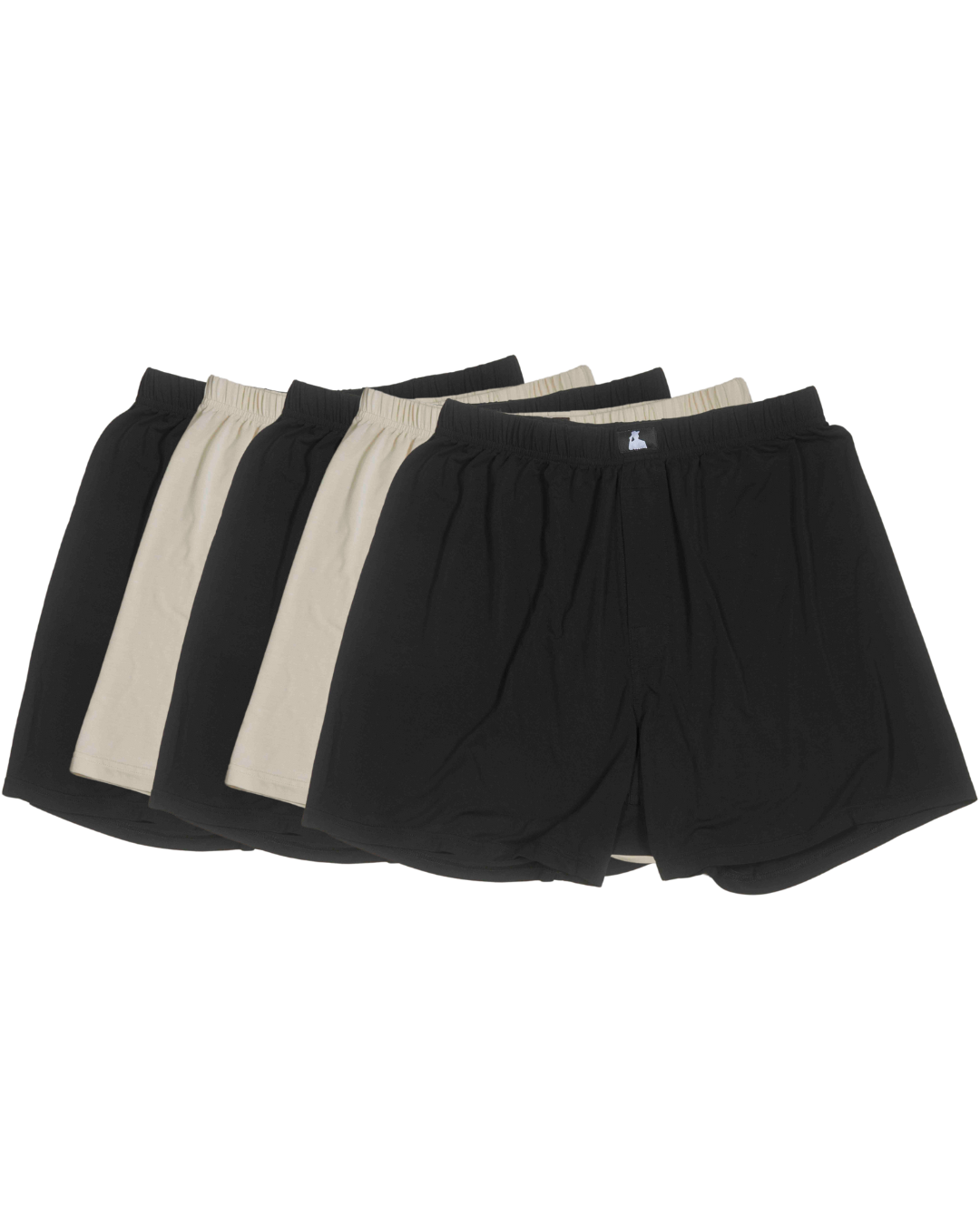Cool Men’s Underwear That Stays Cool - and Keeps Your Fertility Intact
Written By The Mr. Fertyl Research & Education Team
Introduction: Comfort Meets Fertility Awareness
Most guys think of underwear in terms of comfort or style – but have you ever considered its impact on your reproductive health? It turns out that something as simple as your choice of boxers or briefs could influence sperm quality. In fact, male factors contribute to fertility issues in about half of couples, and low sperm count is a leading cause [3]. The good news is that making smart underwear choices – like opting for breathable, cooling fabrics may help keep things healthy down there.
In this friendly guide, we’ll explore why breathability and temperature regulation in men’s underwear matter not just for comfort, but also for sperm health. We’ll also introduce you to a game-changing option: Mr. Fertyl’s Bamboo Lyocell underwear, which stays cool, feels super soft, and even helps the planet – all while keeping your fertility intact. Let’s break the ice on a topic that might feel a bit awkward, and see how caring about your “swimmers” and the environment is totally normal (and smart).
Heat and Sperm Health: Why Temperature Matters
Ever wonder why the testicles hang outside the body? It’s all about temperature. The testes need to stay a few degrees cooler than core body temperature to produce healthy sperm [3]. “That is why testes are located outside of the body,” explains reproductive endocrinologist Dr. Celia Dominguez – essentially, “testes were made to be out in the breeze.” [3] In other words, Mother Nature designed things so that your sperm factories don’t overheat.
When testicles get too warm, sperm production can suffer. Wearing snug, non-breathable underwear (like tight briefs) can hold the testicles closer to the body and raise their temperature [3][8]. If the testes are kept several degrees above their ideal temperature, they aren’t able to produce sperm in sufficient quantity or quality [3]. Overheating essentially signals a slowdown in sperm manufacturing, often leading to a lower sperm count.
Scientific research backs this up. A notable study of 656 men found that those who primarily wore loose boxers had significantly higher sperm concentrations and total counts than men who wore tight-fitting underwear [2]. The boxer-wearers’ sperm concentration was about 25% higher on average, and total sperm count about 17% higher, compared to men in briefs or jockeys[2]. That’s a sizable difference linked just to underwear choice. The likely reason? Boxers keep things cooler by allowing more airflow, whereas tight briefs can create a mini sauna in your shorts.
It’s not just about tightness either – fabric type plays a role in heat build-up. Some materials breathe better than others. We’ll get into fabrics next, but the key takeaway here is: Keeping your groin cool is important for sperm health. Consistently elevated scrotal temperatures (from hot tubs, saunas, or yes, overly snug underwear) are known to impair sperm production [8]. So, if you’re planning for a family (now or in the future), it makes sense to give your testicles a cooler, more comfortable home.
The Problem with Synthetic Underwear: Trapped Heat and Toxins
Take a peek at the label of most mainstream men’s underwear and you’ll find materials like polyester, nylon, or spandex. These synthetic fabrics have some convenient qualities (stretch, durability, etc.), but breathability isn’t one of them. According to health experts, synthetic materials don’t allow your skin to breathe – instead, they trap heat and moisture [4]. Think of it like wearing a plastic bag versus a cotton T-shirt; one gets sweaty and hot, the other stays cooler and drier.
When heat and humidity get trapped in your groin area, it’s not just discomfort or odor at stake. That warm, damp environment can affect sperm. Sperm are best produced in a cool, dry setting – excess warmth can hinder their development, and excess moisture can lead to skin irritation or infections. (Ever notice how athletic gear often emphasizes “moisture-wicking” or breathability? It’s the same idea – you want to stay cool and dry to stay healthy.)
Beyond temperature, synthetic underwear may expose your skin to some unwelcome chemicals. How so? Many synthetic fabrics are essentially plastics, derived from petrochemicals. They can contain additives like dyes, stabilizers, or even chemical finishes from manufacturing. Research is increasingly finding that plastics can leach endocrine-disrupting chemicals (like phthalates and BPA) into our environment and bodies [5]. For example, microplastic fibers shed from clothing have been shown to carry chemical additives that may leach out and affect the human endocrine system (hormone system) [5]. This is concerning because hormones like testosterone are crucial for sperm production – interference from chemicals could potentially impact fertility.
To put it in perspective, an experimental study on animals highlighted the risk of certain synthetics: researchers found that polyester underwear had a noticeable negative effect on spermatogenesis (sperm production) over time [1]. In that study, subjects wearing polyester had significant drops in sperm count and motility, plus an increase in abnormal sperm forms, while those wearing cotton did not [1]. Once the polyester was removed, sperm production gradually recovered in most cases. The authors theorized the issue might be due to electrostatic charges from polyester, but whatever the cause, the message is clear – not all fabrics are sperm-friendly.
Now, let’s be fair: wearing synthetic briefs for a day isn’t going to instantly zap your fertility. But if you’re wearing non-breathable, heat-trapping, chemical-laden underwear day in and day out, it could be one piece of the puzzle affecting your reproductive health. Mainstream brands don’t often talk about this. After all, “fertility” isn’t a typical selling point for men’s boxers – and discussing it might feel a little uncomfortable. But your health is worth it. There’s absolutely nothing weird about a guy caring how his lifestyle (even clothing choices) impacts his ability to someday have kids. Male fertility matters, and it’s affected by factors in our daily environment more than you might realize (fact: studies suggest global sperm counts have fallen significantly in the last 50 years[6] – likely due to a mix of environmental and lifestyle factors).
The bottom line in this section: conventional synthetic underwear can run hot and may bring along unwanted chemicals. That’s a double whammy you don’t need near some of the most important (and sensitive) parts of your body. So, what’s the alternative? Glad you asked.
Meet Bamboo Lyocell: The Cool, Breathable Alternative
Imagine underwear that feels luxuriously soft, breathes like a dream, and keeps you cool without any toxic chemicals in the mix. That’s what you get with bamboo Lyocell fabric, the material used in Mr. Fertyl’s underwear line. If you haven’t heard of it, Bamboo Lyocell is a fabric made from bamboo pulp, using a modern, eco-friendly process. Don’t let the technicalities scare you – all you need to know is that it’s a natural fiber derived from bamboo plants, and it’s a superstar when it comes to comfort and sustainability.
So, why is Bamboo Lyocell great for your crown jewels and your “family jewels”? For starters, it’s incredibly breathable and moisture-wicking. Bamboo fibers have a unique structure with micro-gaps that allow air to circulate and absorb moisture efficiently. As a result, bamboo fabric can absorb sweat and evaporate it rapidly, keeping your skin drier and cooler than synthetic fabrics (or even many cotton blends) [9]. In fact, the cross-section of a bamboo fiber is filled with micro-holes, giving it much better moisture absorption and ventilation than other materials [9]. Translation: bamboo underwear helps prevent that swampy feeling on a hot day, and it provides a cooler environment which your sperm will appreciate.
Bamboo Lyocell is also super soft – often compared to silk or cashmere in feel [7]. If you’ve ever felt bamboo fabric, you know it has a smooth, gentle touch on the skin. For sensitive areas, that’s a big plus. You don’t want rough, scratchy textiles causing irritation. Many men find bamboo-based underwear much more comfortable for all-day wear, especially if you’re moving around a lot. And because bamboo Lyocell fibers are naturally smooth (no sharp spurs like some cotton), they’re less likely to cause friction or chafing. This softness isn’t just a luxury; it means less distraction and adjusting, and more focus on your day.
Crucially, Mr. Fertyl’s Bamboo Lyocell underwear is free from harmful dyes or chemical finishes. Bamboo Lyocell is made in a closed-loop process that avoids the nasty chemicals used in conventional fabric production. And since bamboo as a crop doesn’t need heavy pesticide or fertilizer use, the raw material is cleaner too [7]. (Contrast that with non-organic cotton, which is one of the most pesticide-intensive crops – those pesticide residues can linger in fabric [7]. Yikes.) What this means for you is “toxin-free” comfort – you can wear Mr. Fertyl undies without worrying that your skin (and reproductive organs) are absorbing residues of formaldehyde, phthalates, or other mystery chemicals. The fabric is also naturally hypoallergenic and antibacterial, so it’s gentle on sensitive skin and resists odors. No more synthetic fabrics rubbing you the wrong way or causing rashes.
Let’s not forget temperature regulation. Bamboo Lyocell has been noted to be thermo-regulating, meaning it helps keep you cool in warm weather and warm in cool weather by dissipating heat and wicking moisture. It’s the same reason bamboo is popular for bedding – who wouldn’t want sheets that stay cool in summer? In underwear form, this means fewer sticky, sweaty moments. The fabric almost acts like it has its own air conditioning. One source notes that Bamboo Lyocell fibers are “soft, breathable, and highly absorbent,” offering great ventilation with a lower environmental impact than traditional viscose [7].
All these qualities make Bamboo Lyocell a fertility-friendly choice. By keeping your groin cooler and drier, you’re helping maintain an optimal environment for sperm production. By avoiding harsh chemicals, you reduce potential exposure to things that could mess with your hormones or irritate your skin. It’s a smart, holistic approach: take care of the environment for your sperm, and they’ll take care of you.

Wearing the Wrong Underwear? Cool Men Deserve Cool Men’s Underwear.
Shop Cool UnderwearMr. Fertyl’s Underwear: For Men Who Care (About Health and the Planet)
Mr. Fertyl’s Bamboo Lyocell underwear isn’t just another pair of boxer's – it represents a shift in how we think about men’s wellness and sustainability. The ethos here is that taking care of your reproductive health and taking care of the Earth can go hand-in-hand. And there’s nothing un-masculine about either! On the contrary, being proactive about your health is a responsible move, and being mindful of eco-friendly products shows awareness of the bigger picture.
Let’s talk eco-friendly for a moment. Bamboo is one of the most sustainable resources around. It’s a grass that can grow up to three feet per day and regenerates after harvesting without needing to be replanted [7]. It requires minimal water (mostly just rain) and no pesticides or herbicides to thrive [7]. In contrast, traditional cotton farming guzzles water and uses a lot of chemicals – cotton alone accounts for about 16% of global pesticide use [7]. By choosing bamboo-based clothing, you’re supporting a crop that has a gentler footprint on the environment. Plus, bamboo fiber is biodegradable, unlike synthetic polyester which can persist as waste (or microplastics) for hundreds of years. So when your bamboo undies eventually wear out, they won’t leave behind plastic pollution.
Mr. Fertyl’s commitment to Bamboo Lyocell means the underwear is made through an eco-conscious process as well. The Lyocell method recycles water and solvents, drastically reducing chemical waste compared to ordinary bamboo viscose processing. The result is a fabric that delivers all those comfort benefits we discussed, with a cleaner conscience. You can feel good knowing your underwear wasn’t made at the expense of factory workers’ health or rivers turned toxic (sadly a problem with some textile manufacturing). It’s a small daily choice that aligns with caring for the planet.
Importantly, Mr. Fertyl’s brand doesn’t rely on macho gimmicks or testosterone-fueled marketing. You won’t see clichéd slogans about “alpha male” this or that. Instead, the focus is on real health and real sustainability – things that actually matter in the long run. It’s a refreshing change in the men’s apparel space. By highlighting fertility and environmental impact, Mr. Fertyl is clearly different from the pack. And by reading this far, you’re clearly someone who values knowledge and well-being over just following the herd. That’s something to be proud of.
Breaking the Stigma: It’s Normal to Care About Fertility
Let’s address the elephant in the room: talking about sperm health or fertility can feel a bit awkward. Culturally, we haven’t exactly encouraged these discussions. But that’s changing – and for good reason. Male fertility is just as important as female fertility, yet it’s often overlooked. Normalizing the conversation can help men make informed decisions about their health. Whether you’re actively trying for a baby or just want to keep your options open for the future, paying attention to things like diet, exercise, and yes, even underwear choices, is simply part of responsible self-care.
Wearing comfortable, fertility-conscious underwear is a subtle, private way of looking after yourself. No one else even has to know you’re doing it – but you’ll know, and you can be confident you’re doing something positive for your health. Plus, let’s be honest: when your underwear is breathable and soft, you just feel better overall. It’s one less source of stress or distraction. Lower stress and more comfort can indirectly benefit reproductive health too (stress hormones don’t do any favors for your testosterone levels or libido).
And if someone does catch a glimpse of those stylish Mr. Fertyl underwear in the locker room, you’ve got a cool story to tell. “They’re made of bamboo and actually help keep my swimmers cool and happy,” you might say – which is a great conversation starter, if nothing else! Chances are, your buddy might be intrigued (or jealous) and want a pair for himself once he hears about the comfort and health angle.
Remember, caring about fertility doesn’t mean you’re planning for kids right this second. It’s simply keeping an eye on an aspect of health that often flies under the radar. Think of it like heart health or mental health – another piece of the wellness puzzle. And caring about the environment doesn’t mean you’re a tie-dye-wearing treehugger (though nothing wrong with that); it just means you’re thoughtful about the impact of the products you buy. There’s a growing community of men who are health-conscious and eco-conscious, and Mr. Fertyl is making products for exactly that community. You’re not alone, and you’re not odd for thinking about these things – you’re ahead of the curve.

Cool Men’s Underwear That’s Better for You and the Planet.
Upgrade To Bamboo CoolConclusion: Stay Cool, Stay Fertile, Stay Comfortable
When it comes to men’s underwear, it’s time to go beyond the old “boxers vs. briefs” debate and ask a better question: Is my underwear helping or hurting my health? We’ve learned that breathability and temperature control are more than just comfort features – they’re integral to sperm production and fertility. Tight, synthetic undies that heat things up could be doing your swimmers a disservice. On the flip side, cool and breathable underwear can give your sperm a friendlier home, potentially boosting your chances of robust fertility.
Mr. Fertyl’s Bamboo Lyocell underwear embodies everything you’d want in a fertility-friendly, eco-friendly undergarment. It keeps you cool with breathable, moisture-wicking fabric; it wraps you in cloud-like softness; and it’s made without the harsh chemicals and environmental damage associated with many mainstream fabrics. It’s basically an investment in both your personal health and the planet’s health – all in one comfy pair of underwear.
So, if you’ve never given a second thought to what your underwear is made of, now is a great time to start. Making this simple switch to a product like Mr. Fertyl’s doesn’t require any habit changes or effort – you just wear them like any other pair. But the impacts can be far-reaching: happier skin, potentially happier sperm, and a happier Earth. That’s a triple win worth celebrating.
In the end, “fertility-friendly” underwear isn’t about paranoia or overselling claims; it’s about acknowledging that small things can make a difference. It’s about empowering men with knowledge and better choices. So go ahead – stay cool where it counts, and keep your fertility intact with smarter underwear choices. Your future self (and maybe future family) will thank you, and so will the environment. Now that’s truly cool.
- Shafik A. Effect of different types of textile fabric on spermatogenesis: an experimental study.Urol Res. 1993;21(5):367-370. PMID: 8279095 Source
- Minguez-Alarcon L, et al. Type of underwear worn and markers of testicular function among men attending a fertility center.Hum Reprod. 2018;33(9):1749-1756. PMID: 30052750 Source
- WebMD. Boxers vs. Briefs: Increasing Sperm Count. (C. Dominguez, MD & A. Grunebaum, MD interviews) WebMD Feature Archive, 2004 Source
- Healthline. 8 Underwear Tips for Vaginal Health. (A. Kelly-Jones, MD interview) Healthline Media, 2018 Source
- PBS NewsHour. Laundry is a top source of microplastic pollution... PBS.org, Oct 2021Source
- CNN (via NLM). Sperm counts may be declining globally, review finds... CNN Health, Nov 18, 2022 Source
- Textile Focus. Bamboo Fiber: A Sustainable Alternative to Cotton. TextileFocus.com, 2023 (Fabric properties) Source
- WebMD. Are You Unknowingly Lowering Your Sperm Count? (Sarah Vij, MD interview) Cleveland Clinic – Health Essentials, Sept 17, 2019 Source
- Kumar, A. (n.d.). Bamboo: The natural antibacterial textile. Fibre2Fashion. Source

